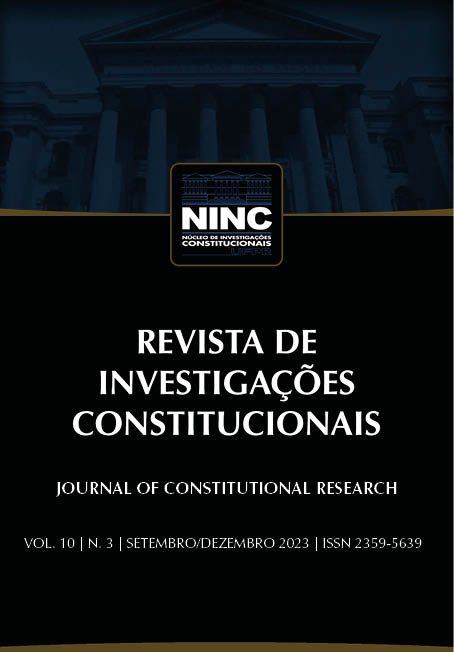The sovereign minority: the qualified majority rule for constitutional amendments
DOI:
https://doi.org/10.5380/rinc.v10i3.89855Palavras-chave:
majority rule, qualified majority rule, constitutional amendment, precommitment, constitutional rigidity.Resumo
The paper challenges the widespread intuition according to which the constitutional amendment procedure normatively requires the application of the qualified majority rule as a collective decision rule. To this end, the relationship between majority rule and the qualified majority is clarified and the link between qualified majority and constitutional supremacy is questioned. The institutional role played by the qualified majority rule of the constitutional amendment in parliament is then clarified in order to discredit the widespread justification of the qualified majority based on the notion of precommitment.
Referências
ACKERMAN, Bruce. Social justice in the liberal state. New Haven: Yale University Press, 1980.
ALBERT, Richard. The Expressive Function of Constitutional Amendment Rules. Revista de Investigações Constitucionais, Curitiba, vol. 2, n. 1, p. 7-64, 2015.
ALBERT, Richard. Amendment and revision in the unmaking of constitutions. In LANDAU, David E.; LERNER, Hanna (Eds). Comparative constitution making. Cheltenham, UK /Northampton, USA: Edward Elgar Publishing, 2019. p. 117-140.
ARENDT, Hannah. On revolution. New York: Penguin Books, 2006.
ATRIA, Fernando. La Constitución tramposa. Santiago: LOM ediciones, 2013.
ATRIA, Fernando. La forma del derecho. Madrid: Marcial Pons Ediciones Jurídicas, 2016.
BADURA, Peter. Verfassungsänderung, Verfassungswandel, Verfassungsgewohnheitsrecht. In ISENSEE, Joseph; KIRCHHOF, Paul (Eds.). Handbuch des Staatsrechts der Bundesrepublik Deutschland, Band XII: Normativität und Schutz der Verfassungs. 3. ed. Heideger: C.F. Müller, 2014, p. 591-612.
BARBER, Nick. Why entrench? International Journal of Constitutional Law, Oxford, vol. 14, n. 2, p. 325-350, 2016.
BAYÓN, Juan Carlos. Derechos, democracia y constitución. Discusiones. Derechos y Justicia Constitucional, Bahía Blanca, vol. 1, p. 65-94, 2000.
BEITZ, Charles R. Political equality: an essay in democratic theory. Princeton, N.J: Princeton University Press, 1989.
BESSON, Samantha. The morality of conflict: reasonable disagreement and the law. Oxford: Hart Publishing, 2005.
BÖCKENFÖRDE, Ernst-Wolfgang. Demokratie als Verfassungsprinzip. In BÖCKENFÖRDE, Ernst-Wolfgang. Staat, Verfassung, Demokratie. Frankfurt am Main: Suhrkamp, 1991, p. 289-378.
BOEHL, Henner Jörg. Verfassungsgebung im Bundesstaat: ein Beitrag zur Verfassungslehre des Bundesstaates und der konstitutionellen Demokratie. Berlin: Duncker & Humblot, 1997.
BRYCE, James. Studies in history and jurisprudence. Oxford: Clarendon Press, 1901.
BRYDE, Brun-Otto. Verfassungsentwicklung: Stabilität und Dynamik im Verfassungsrecht der Bundesrepublik Deutschland. Baden-Baden: Nomos-Verl.-Ges, 1982.
BUCHANAN, James M.; TULLOCK, Gordon. The calculus of consent: logical foundations of constitutional democracy. Michigan: University of Michigan Press, 2008.
CARRÉ DE MALBERG, Raymond. La ley, expresión de la voluntad general. Madrid: Marcial Pons, 2011.
DAHL, Robert. Democracy and its critics. New Haven: Yale University Press, 1989.
DAVIDSON, Donald. Essays on actions and events. 2. ed. Oxford/New York: Clarendon Press; Oxford University Press, 2001.
DREIER, Horst. Art. 79 II. In DREIER, Horst (Eds.). Grundgesetz Kommentar, Bd. II, 2. ed. Tübingen: Mohr Siebeck, 2006, p. 2009-2024.
DREIER, Hans. Gilt das Grundgesetz ewig? Munich: Carl Friedrich von Siemens Stiftung, 2008.
ELKINS, Zachary; GINSBURG, Tom, MELTON, James. The Endurance of National Constitutions. Cambridge, Cambridge University Press. 2009.
ELSTER, Jon. Constitutionalism in Eastern Europe: An Introduction. University of Chicago Law Review, Chicago, vol. 58, n. 2, 1991.
ELSTER, Jon. Ulysses unbound: studies in rationality, precommitment, and constraints. Cambridge: Cambridge University Press, 2000.
FEREJOHN, John; SAGER, Lawrence. Commitment and Constitutionalism. Texas Law Review, Texas, vol. 81, p. 1929-1963. 2003.
FERRAJOLI, Luigi. Democracia constitucional y derechos fundamentales: la rigidez de la constitución y sus garantías. In FERRAJOLI, Luigi; MORESO, Josep Joan; ATIENZA, Manuel (Eds). La teoría del derecho en el paradigma constitucional. Madrid: Fundación Coloquio Jurídico Europeo, 2008, p. 71-116.
GILBERT, Michael D. Entrenchment, Incrementalism, and Constitutional Collapse. Virginia Law Review, Virginia, vol. 103, n. 4, p. 631-671, jun. 2017.
GOODIN, Robert E.; LIST, Christian. Special Majorities Rationalized. British Journal of Political Science, Cambridge, vol. 36, n. 2, p. 213-241, 2006.
GOSSERIES, Axel. The Intergenerational Case for Constitutional Rigidity. Ratio Juris, New Jersey, vol. 27, n. 4, p. 528-539, 2014.
GRIMM, Dieter. Die Zukunft der Verfassung. 2. ed., Frankfurt am Main: Suhrkamp, 1991.
GRIMM, Dieter. Types of Constitutions. In ROSENFELD, Michel; SAJÓ, András (Ed.). The Oxford Handbook of Comparative Constitutional Law. Oxford: Oxford University Press, 2012, p. 98-132.
GUSY, Christoph. Das Mehrheitsprinzip im demokratischen Staat. In GUGGENBERGER, Bernd; OFFE, Claus (Eds.). An den Grenzen der Mehrheitsdemokratie: Politik und Soziologie der Mehrheitsregel. Opladen: Westdeutscher Verlag, 1984, p. 61–82.
GUZMÁN, Jaime. El camino político. Revista Realidad, Santiago, n. 7, dic. 1979.
HAMILTON, Alexander; MADISON, James, JAY, John. The federalist papers. New York: Dover Publications, Inc., 2014.
HART, Herbert Lionel Adolphus. The concept of law. Oxford: Clarendon Press, 1961.
HESSE, Konrad. Grundzüge des Verfassungsrechts der Bundesrepublik Deutschland. 20. ed. Heidelberg: C.F. Müller Verlag, 1999.
HEUN, Werner. Das Mehrheitsprinzip in der Demokratie: Grundlagen, Struktur, Begrenzungen. Berlin: Duncker & Humblot, 1983.
HOHNERLEIN, Jakob. Recht und demokratische Reversibilität: verfassungstheoretische Legitimation und verfassungsdogmatische Grenzen der Bindung demokratischer Mehrheiten an erschwert änderbares Recht. Tübingen: Mohr Siebeck, 2020.
HOLMES, Stephen. Passions and constraint: on the theory of liberal democracy. Chicago: University of Chicago Press, 1995.
JÄGER, Wolfgang. Mehrheit Minderheit, Majorität, Minorität. In BRUNNER, Otto; CONZE, Werner; KOSELLECK, Reinhart (Eds.). Geschichtliche Grundbegriffe. Historisches Lexikon zur politisch-sozialen Sprache in Deutschland. Band 3. H-Me. Stuttgart: Klett-Cotta, 1982, p. 1021-1062.
JELLINEK, Georg. Gesetz und Verordnung: staatsrechtliche Untersuchungen. Freiburg i. Br.: Mohr, 1887.
JELLINEK, Georg. Das Recht der Minoritäten: Vortag gehalten in der Juristischen Gesellschaft zu Wien. Wien: A. Hölder, 1898.
JELLINEK, Georg. Allgemeine Staatslehre. 3. ed. Bad Homburg v.d. H.: Gentner, 1960.
KELSEN, Hans. Vom Wesen und Wert der Demokratie. Tübingen: J.C.B. Mohr, 1929.
KELSEN, Hans. Reine Rechtslehre: mit einem Anhang: das Problem der Gerechtigkeit. Studienausgabe der 2. Auflage 1960. Tübingen: Mohr Siebeck, 2017.
KELSEN, Hans. Allgemeine Staatslehre. Studienausgabe der Originalausgabe 1925. Tübingen: Mohr Siebeck, 2019.
KLEIN, Claude; SAJÓ, András. Constitution-Making: Process and Substance. In ROSENFELD, Michel; SAJÓ, András (Ed.). The Oxford Handbook of Comparative Constitutional Law. Oxford: Oxford University Press, 2012, p. 419-441.
LABAND, Paul. Das Staatsrecht des Deutschen Reiches: in vier Bänden. 5. ed. Tübingen: Mohr, 1911.
LEVINSON, Sanford. Designing an Amendment Process. In FEREJOHN, John A.; RAKOVE, Jack N.; RILEY, Jonathan (Eds). Constitutional culture and democratic rule. Cambridge, UK; New York, USA: Cambridge University Press, 2001, p. 271-287.
LEVINSON, Sanford. The Political Implications of Amending Clauses. Constitutional Commentary, Minnesota, vol. 13, p. 107-123, jan. 1996.
LIJPHART, Arend. Patterns of democracy: Government Forms and Performance in Thirty-six Countries. New Haven: Yale University Press, 1999.
LIJPHART, Arend. Thinking about democracy: power sharing and majority rule in theory and practice. London/New York: Routledge, 2008.
LOEWENSTEIN, Karl. Über Wesen, Technik und Grenzen der Verfassungsänderung: Vortrag gehalten vor der Berliner Juristischen Gesellschaft am 30. Juni 1960. Berlin: De Gruyter, 1961.
LOUGHLIN, Martin. Against constitutionalism. Cambridge/Massachusetts: Harvard University Press, 2022.
LUTZ, Donald S. Toward a Theory of Constitutional Amendment. In LEVINSON, Sanford (Ed.). Responding to Imperfection. The Theory and Practice of Constitutional Amendment. Princeton: Princeton University Press, 1995, p. 237-274.
MARTÍ, José Luis. Democracia y deliberación. Una reconstrucción del modelo de Jon Elster. Revista de Estudios Políticos (Nueva Época), Madrid, n. 113, p. 161-192, jul-sep. 2001.
MARTÍ, José Luis. Is Constitutional Rigidity the Problem? Democratic Legitimacy and the Last Word. Ratio Juris, New Jersey, vol. 27, n. 4, p. 550-558, 2014.
MAY, Kenneth. A Set of Independent Necessary and Sufficient Conditions for Simple Majority Decision. Econometrica, New Haven, vol. 20, n. 4, pp. 680-84, 1952.
MÜLLER-SALO, Johannes. Diachrone Legitimität. Die Beständigkeit politischer Ordnungen als Herausforderung der Demokratie. Frankfurt am Main: Campus Verlag, 2021.
OFFE, Claus. Fessel und Bremse. Moralische und institutionelle Aspekte ‘intelligenter Selbstbeschränkung’. In HONNETH, Axel; MCCARTHY, Thomas, OFFE, Claus,
WELLMER, Alfred (Eds.). Zwischenbetrachtungen – Im Prozeß der Aufklärung. Jürgen Habermas zum 60. Geburtstag. Frankfurt am Main: Suhrkamp, p. 739-774.
PARDO-ÁLVAREZ, Diego. ¿Maior et sanior pars? Una justificación de la regla de la mayoría parlamentaria. Ius et Praxis, Talca, vol. 22, n. 2, p. 457-96, 2016.
PARDO-ÁLVAREZ, Diego. Das Rechtfertigungsdefizit des qualifizierten Mehrheitserfordernisses: zugleich ein Beitrag zur Rechtfertigung der parlamentarischen Mehrheitsregel. Tübingen: Mohr Siebeck, 2020.
PARDO-ÁLVAREZ, Diego. Constitucionalismo calificado: la regla de la mayoría calificada del art. 133 inc. 3o de la Constitución Política de Chile. Revista de Derecho Universidad de Concepción, Concepción, vol. 88, n. 247, p. 13-43, 2020.
PREUSS, Ulrich Klaus. Revolution, Fortschritt und Verfassung: zu einem neuen Verfassungsverständnis. Frankfurt am Main: Fischer Taschenbuch, 1994.
RIKER, William H. Liberalism against populism: a confrontation between the theory of democracy and the theory of social choice. San Francisco: W.H. Freeman, 1982.
RISSE, Mathias. Arguing for Majority Rule. Journal of Political Philosophy, New Jersey, vol. 12, n. 1, p. 41-64, 2004.
ROBERTS, John; CHEMERINSKY, Erwin. Entrenchment of Ordinary Legislation: A Reply to Professors Posner and Vermeule. California Law Review, California, vol. 91, n. 6, p. 1773–1820, 2003.
SADURSKI, Wojciech. Equality and legitimacy. Oxford; New York: Oxford University Press, 2008.
SAGER, Lawrence. The Birth Logic of a Democratic Constitution. In FEREJOHN, John A.;
RAKOVE, Jack N.; RILEY, Jonathan (Eds). Constitutional Culture and Democratic Rule. Cambridge, UK; New York, USA: Cambridge University Press, 2001, p. 110-144.
SAJÓ, András; UITZ, Renáta. The constitution of freedom: an introduction to legal constitutionalism. Oxford, U K: Oxford University Press, 2017.
SCHAUER. Frederick. Amending the Pressupositions of a Constitution. In LEVINSON, Sanford (Ed.). Responding to Imperfection. The Theory and Practice of Constitutional Amendment. Princeton: Princeton University Press, 1995, p. 145-161.
SCHEUNER, Ulrich. Das Mehrheitsprinzip in der Demokratie. Opladen: Westdeutscher Verlag, 1973.
SCHILLING, Theodor. Rang und Geltung von Normen in gestuften Rechtsordnungen. Baden-Baden: Nomos, 1994.
SCHMITT, Carl. Verfassungslehre. 3. ed. Berlin: Duncker & Humblot, 1957.
SCHMITT, Carl. Legalität und Legitimität. 5. ed. Berlin: Duncker & Humblot, 1993.
SCHWARTZBERG, Melissa. Counting the many: the origins and limits of supermajority rule. New York: Cambridge University Press, 2014.
SEN, Amartya. Collective choice and social welfare. San Francisco: Holden-Day, 1970.
STEIN, Tine. Selbstbindung durch Recht im demokratischen Verfassungsstaat. Aus Politik und Zeitgeschichte, Bonn, n. 37, p. 1-8, sep. 2021.
TSEBELIS, George. Veto players: how political institutions work. Princeton: Princeton University Press, 2002.
TUSHNET, Mark. Constitution. In ROSENFELD, Michel; SAJÓ, András (Ed.). The Oxford Handbook of Comparative Constitutional Law. Oxford: Oxford University Press, 2012, p. 218-232.
WALDRON, Jeremy. Law and disagreement. Oxford: Clarendon Press, 1999.
WESCHE, Eberhard. Tauschprinzip, Mehrheitsprinzip, Gesamtinteresse: zur Methodologie normativer Ökonomie u. Politik. Stuttgart: Klett-Cotta, 1979.
Downloads
Publicado
Como Citar
Edição
Seção
Licença
Autores que publicam nesta revista concordam com os seguintes termos:- Autores mantém os direitos autorais e concedem à revista o direito de primeira publicação, com o trabalho simultaneamente licenciado sob a Creative Commons - Atribuição 4.0 Internacional que permite o compartilhamento do trabalho com reconhecimento da autoria e publicação inicial nesta revista.
- Autores têm autorização para assumir contratos adicionais separadamente, para distribuição não-exclusiva da versão do trabalho publicada nesta revista (ex.: publicar em repositório institucional ou como capítulo de livro), com reconhecimento de autoria e publicação inicial nesta revista.
- Autores têm permissão e são estimulados a publicar e distribuir seu trabalho online (ex.: em repositórios institucionais ou na sua página pessoal) a qualquer ponto antes ou durante o processo editorial, já que isso pode gerar alterações produtivas, bem como aumentar o impacto e a citação do trabalho publicado (Veja O Efeito do Acesso Livre).
























